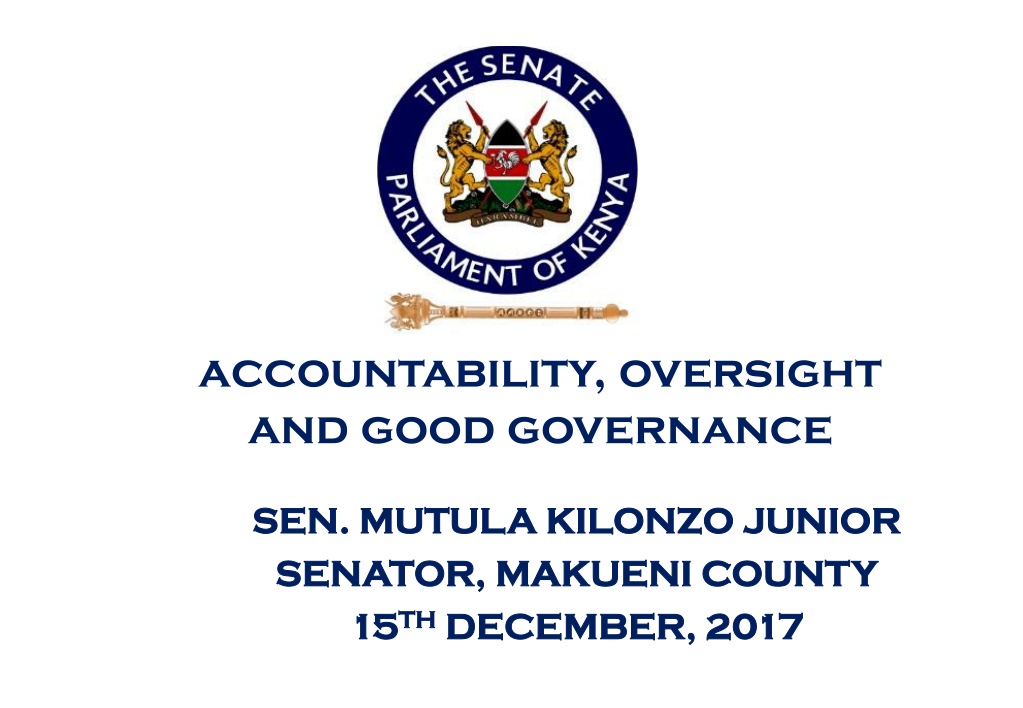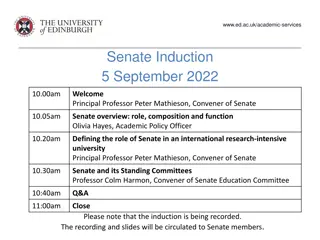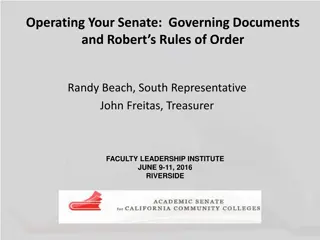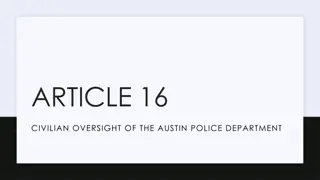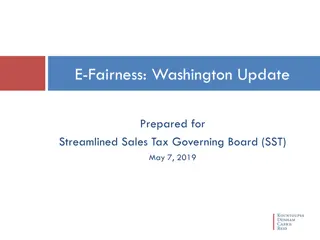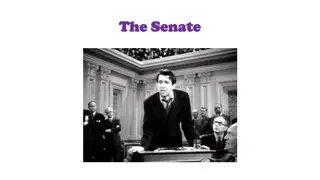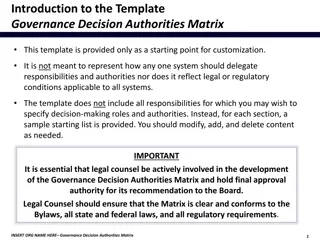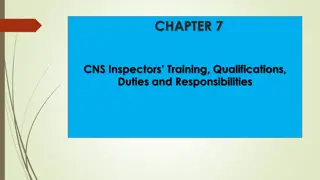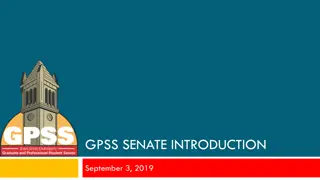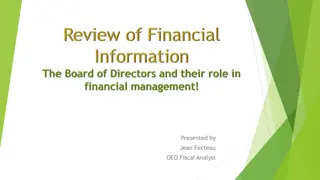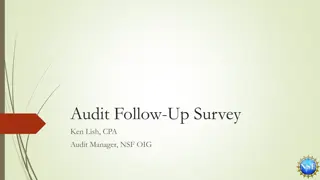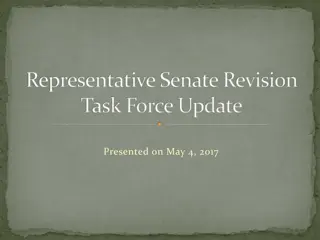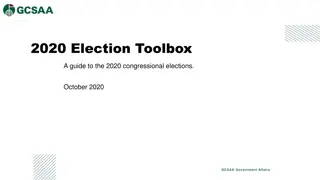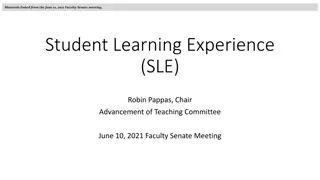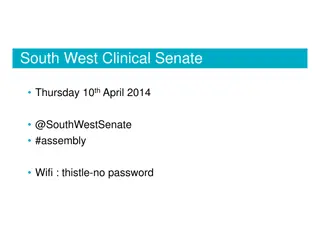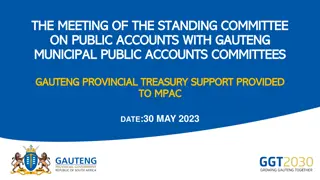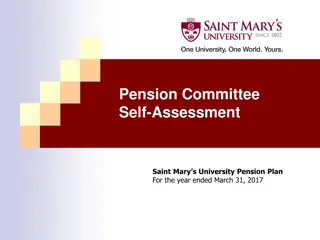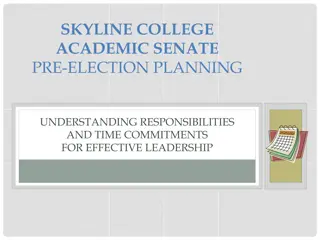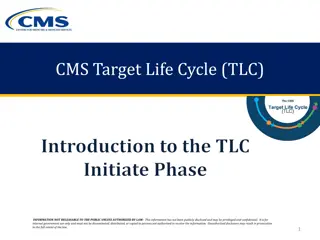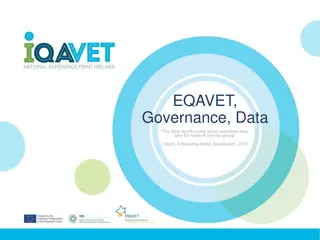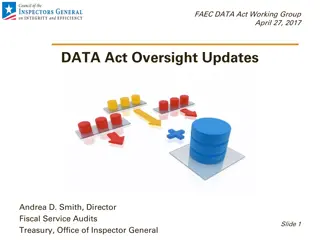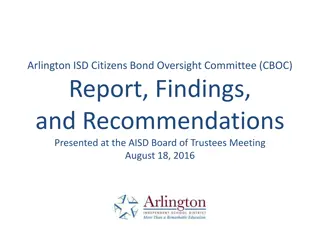Importance of Oversight and Governance in Senate Responsibilities
This presentation emphasizes the significance of accountability, oversight, and good governance in the roles of the Senate and County Assemblies. It covers the why, mandate of the Senate, differences in mandates, experiences, challenges, and a way forward to enhance transparency and public trust in government operations.
Download Presentation

Please find below an Image/Link to download the presentation.
The content on the website is provided AS IS for your information and personal use only. It may not be sold, licensed, or shared on other websites without obtaining consent from the author. Download presentation by click this link. If you encounter any issues during the download, it is possible that the publisher has removed the file from their server.
E N D
Presentation Transcript
accountability, oversight and good governance SEN. SEN. MUTULA MUTULA KILONZO SENATOR, SENATOR, MAKUENI 15 15TH DECEMBER, 2017 KILONZO JUNIOR MAKUENI COUNTY THDECEMBER, 2017 JUNIOR COUNTY
Overview This presentation covers the following- Why Oversight? The Mandate of the Senate The Mandate of a County Assembly What is the Difference in the mandate? Experiences and Challenges Relating to Oversight in the Eleventh Parliament Way Forward 2
1. WHY OVERSIGHT? The key functions of Parliamentary Oversight as outlined in the Tools for Parliamentary Oversight, published by the Inter-Parliamentary Union, can be described as follows - to detect and prevent abuse, arbitrary behaviour, or illegal and unconstitutional conduct on the part of the government and public agencies. At the core of this function is the protection of the rights and liberties of citizens ; 3
.cont to hold the government to account in respect of how the taxpayers money is used. It detects waste within the machinery of government and public agencies. Thus it can improve the efficiency, economy and effectiveness of government operations ; to ensure that policies announced by the government and authorized by parliament(legislature) are actually delivered. This function includes monitoring the achievement of goals set by legislation and the government s own programmes ; and 4
.cont to improve the transparency of government operations and enhance public trust in the government. 5
2. THE MANDATE OF THE SENATE The mandate of the Senate is derived from various provisions of the Constitution- Article 1 of the Constitution provides as follows- All sovereign power belongs to the people of Kenya and shall be exercised only in accordance with this Constitution. The people may exercise their sovereign power either directly or through their democratically elected representatives. 6
.cont Sovereign power under this Constitution is delegated to the following State organs, which perform their functions in accordance with this Constitution- Parliament and the legislate assemblies in the county governments; The national executive and the executive structures in the county governments; and The judiciary and independent tribunals. The sovereign power is exercised at- The national level; and The county level. 7
.cont Article 94 of the Constitution in providing for the role of Parliament makes reference to the legislative mandate of both Houses of Parliament in the following terms- (1) The legislative authority of the Republic is derived from the people and, at the national level, is vested in and exercised by Parliament. (4) Parliament shall protect this Constitution and promote the democratic governance of the Republic. 8
.cont (5) No person or body, other than Parliament, has the power to make provision having the force of law in Kenya except under authority conferred by this Constitution or by legislation. On the legislative mandate of the Senate in particular, Article 96 of the Constitution provides as follows- (1) The Senate represents the counties, and serves to protect the interests of the counties and their governments. 9
.cont (2) The Senate participates in the law-making function of Parliament by considering, debating and approving Bills concerning counties, as provided in Articles 109 to 113. (3) The Senate determines the allocation of national revenue among counties, as provided in Article 217, and exercises oversight over national revenue allocated to the county governments. 10
.cont The Courts have also given guidance in trying to unravel the mandate of the Senate. The former Chief Justice Willy Mutunga in the Supreme Court s Advisory Opinion, Reference No. 2 of 2013, Speaker of the Senate & Anor. Vs The Attorney General & Anor, recognized the pivotal role of the Senate by giving a background on the evolution of devolution in Kenya. He stated- 11
.cont [182]The current devolution provisions in Chapter 11 of the new Constitution are a major shift from the fiscal and administrative decentralisation initiatives that preceded it. It encompasses elements of political, administrative and fiscal devolution. There is a vertical and horizontal dispersal of power that puts the exercise of State power in check. Importantly, the Constitution has created a Senate, an institution that enjoys direct legitimacy and a popular mandate, commanding it to be the protector of devolution. 12
3. THE MANDATE OF COUNTY ASSEMBLIES The mandate of the County Assemblies is likewise derived from various provisions of the Constitution- Article 1 of the Constitution provides as follows- All sovereign power belongs to the people of Kenya and shall be exercised only in accordance with this Constitution. The people may exercise their sovereign power either directly or through their democratically elected representatives. 13
cont Sovereign power under this Constitution is delegated to the following State organs, which perform their functions in accordance with this Constitution- Parliament and the legislate assemblies in the county governments; The national executive and the executive structures in the county governments; and The judiciary and independent tribunals. 14
cont The sovereign power is exercised at- The national level; and The county level. Article 185 makes reference to the legislative authority of the County Assemblies- (1) The legislative authority of a county is vested in, and exercised by, its county assembly. 15
cont (2) A county assembly may make any laws that are necessary for, or incidental to, the effective performance of the functions and exercise of the powers of the county government under the Fourth Schedule. (3) A county assembly, while respecting the principle of the separation of powers, may exercise oversight over the county executive committee and any other county executive organs. 16
cont (4) A county assembly may receive and approve plans and policies for (a) the management and exploitation of the county s resources; and (b) the development and management of its infrastructure and institutions. Article 226(2) on the accounts and audit of public entities provides as follows- 17
cont (2) The accounting officer of a national public entity is accountable to the National Assembly for its financial management, accounting officer of a county public entity is accountable to the county assembly for its financial management. and the 18
4. WHAT IS THE DIFFERENCE? From the foregoing therefore it is evident that the Constitution confers expressly on the Senate the power to exercise oversight over national revenue allocated to county governments. However a further consideration of the provisions of Article 94(4) of the Constitution indicates that Parliament (consisting of the Senate and the National Assembly) has a wider role of protecting the Constitution and promoting the democratic governance of the Republic . 19
In discharging its oversight function therefore, the Senate does not simply concern itself with the question of the prudent (or imprudent) use of public funds, but goes further to inquire, determine and where appropriate intervene for purposes of protecting the Constitution democratic governance . In carrying out this task the Senate and its committees are guided by the national values and principles of governance set out in Article 10(2) of the Constitution as follows- and promoting 20
patriotism, devolution of power, the rule of law, democracy and participation of the people; national unity, sharing and human inclusiveness, equality, human rights, non- discrimination and marginalised; dignity, equity, social justice, protection of the good governance, integrity, transparency and accountability; and sustainable development. 21
The oversight role of the Senate does not only involve oversight over county governments and other agencies in the devolution structure but also involves oversight over the conduct of certain state officers. For instance under the Constitution, the National Assembly is designated as the indictment chamber in the process of the impeachment of a President while the Senate is designated as the trial chamber in the process of impeachment of the President. Similarly, in the event of the impeachment of a Governor, the respective County Assembly is typically the indictment chamber while the Senate is the trial chamber. In both instances, the Senate determines whether the conduct of the particular state officer necessitates removal from office. 22
While the mandate of the Senate and County Assemblies may broadly be similar because of the nature of Legislatures, the jurisdiction is different, with the mandate of the Assemblies being confined to the relevant County. 23
5. EXPERIENCES AND CHALLENGES OF THE SENATE IN RELATION TO OVERSIGHT IN THE 11TH PARLIAMENT In the 11th Parliament the Senate discharged its oversight mandate through its law-making and investigatory powers. Some of the experiences and challenges are shared below- Oversight through Legislation The Senate in undertaking its oversight role through legislation, passed the following critical pieces of legislation- 24
The County Governments (Amendment) No. 2 Bill of 2014(now an Act); The Public Appointments (County Assembly) Approval Act; County Assembly Services Act; The Office of County Attorney Bill, Senate Bills No.37 of 2014(lapsed in the National Assembly); and The Impeachment Procedure Bill, Senate Bills No. 8 of 2016(lapsed in the National Assembly). 25
Cont In undertaking this role, the Senate faced challenges through Court Suits such as- Council of Governors Vs. the Senate, the National Assembly and 47 Senators -Constitutional Petition No.381 of 2014 The Council of Governors challenged the County Governments (Amendment) Act, 2014(the Sang Bill) for undermining county governments and usurping the powers of County Assemblies by including members of Parliament in the County Development Boards. The High Court declared the Act unconstitutional. 26
Council of Governors v Senate ,Petition Number 187 of 2015 Brief facts of the case In this matter, the Petitioner moved to court following the Senate purporting to investigate the legality of the Kiambu County Finance Act, 2014 through a letter dated 6thMay, 2015 addressed to the Kiambu County Government. 27
Cont Determination of the Court The Court found merit in the petition and declared that per Articles 6(2), 209 and 10 of the Constitution, the Senate cannot scrutinise the process and legality of a county legislation. Thus a permanent injunction was granted restraining the Senate from considering the process and legality of county legislation. 28
Oversight by Committees At the conclusion of consideration of a matter through a Committee, the committee reports back to the Senate (plenary) on its findings and the recommendations made in the report would form the basis of policy direction and recommendations made by the Senate to the relevant government agency involved. The Senate in undertaking its oversight role through Committees considered a number of issues- 29
Cont Petitions A number of Petitions were tabled before the Senate, however, some faced challenges prohibiting a smooth conclusion of the Petitions. An example was a petition by the Senator of Vihiga County, Sen. George Khaniri presented on 25th February, 2016 and referred to the Finance Committee. The petition arose from issues that accrued from a resolution by the Vihiga County Assembly 30
Cont The Governor, in response to the various summons to appear before the Committee, averred that the Senate was acting ultra vires in purporting to sit on appeal on matters that had been considered and voted on by the Vihiga County Assembly. The Governor further averred that the Senate had original but not appellate jurisdiction and could not set aside the determination of a County Assembly. The Committee however proceeded to prosecute the matter as the right of Kenyan citizens to petition public authorities and Parliament is a right conferred by the Constitution. 31
Cont County Public Accounts and Investments The County Public Accounts and Investments Committee and the Finance Committees of the Senate faced a myriad of challenges in the discharge of their mandates. The following cases attest to this- Council of Governors & 6 others v Senate, Petition No. 413 of 2014 Brief facts of the case The Petitioner sued the Senate on the basis of the constitutionality of summons issued in August 2014 to certain governors by the Senate s Sessional Committee on County Public Accounts and Investments. 32
Cont Determination of the Court The Court held thatit is proper, legal, and constitutional for Members of the Executive Committee responsible for finance and the Chief Officers responsible for finance to appear before the Senate or any of its Committee to answer on County Government finances and to generally provide information that helps the Senate to undertake its oversight functions as stipulated in Article 96 of the Constitution. 33
Cont Wycliffe Ambetsa Oparanya & 3 others v Director of Public Prosecutions & another , Constitutional Petition Number 561 Of 2015 Brief facts of the case According to the Petitioners, the decision of the Senate to summon Governor Wycliffe Oparanya to answer questions on the Auditor General s report without giving the County Assembly the opportunity to examine the report and make its conclusions in the first instance undermines the legislative and oversight powers of the County Assembly 34
Cont Determination of the Court The Court held that the Senate cannot exercise its powers under Article 96 of the Constitution in a manner that cripples the oversight mandate of the County Assemblies in violation of the provisions of Articles 6(2) and 189 (1) of the Constitution. It was also determined that the Senate is bound by the provisions of Article 189 (1) of the Constitution to perform its functions and exercise its powers in a manner that respects the functional and institutional integrity as well as the constitutional status and institutions at the County level. 35
Cont International Legal Consultancy Group v Senate & Clerk of the Senate , Constitutional Petition Number 8 of 2014 Brief facts of the case In this matter, the Petitioner filed a petition in February 2013 which challenged the decision of the Senate to summon 9 County Governors and County Executive Members responsible for finance to appear before it and produce various documents and respond to various issues with regard to county finance and fiscal management within their counties. 36
Cont The Petitioner stated that the Senate cannot scrutinize county expenditures in the same way the committees and general assemblies of the County legislatures can. The Petitioner thus concluded that the Senate s power is limited to oversight over national agencies which manage national revenue allocated to counties such as the National treasury. 37
Cont Determination of the Court In its judgement, the High Court held that the Senate can summon Governors, County Executive Members of Finance and County Accounting Officers to appear before it and answer to questions on County Government finances in so far as the National revenue allocated to the respective county is concerned, but such power should not be exercised in an arbitrary and capricious manner. The Court also held that the Senate s power of oversight under Article 96(3) is limited to National revenue allocated to the County Governments. 38
WAY FORWARD Having reflected on the 11th Parliament, I propose the following- That county governments develop a financial reporting procedure for purposes of submitting financial statements to the Auditor-General and other entities envisaged under sections 163 to 165 of the Public Finance Management Act and ensure synchronization of timelines under Articles 228 and 229 of the Constitution. 39
WAY FORWARD That the Senate develops a procedure of implementing the issue of surcharging public officers as envisaged under Article 226(5) of the Constitution. That the Senate reviews its processes within the County Public Accounts Committee in order to ensure that the County Assembly and County Executive Audit Reports are scrutinized expeditiously. and Investments 40
WAY FORWARD That the Senate considers auditing county governments at the county level in order to save time and costs. That the Office of Auditor-General establishes offices in each County to ensure efficiency, as opposed to the current practice where auditors operate from nine (9) Regional Hubs. That each County Government has an internal auditor as a mandatory requirement. 41
WAY FORWARD That the structures at the County Government must be streamlined and managed professionally, especially in terms of qualifications of County Executive Committee Members. 42
